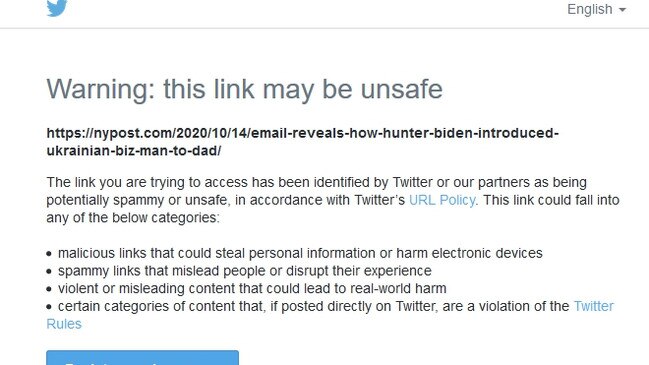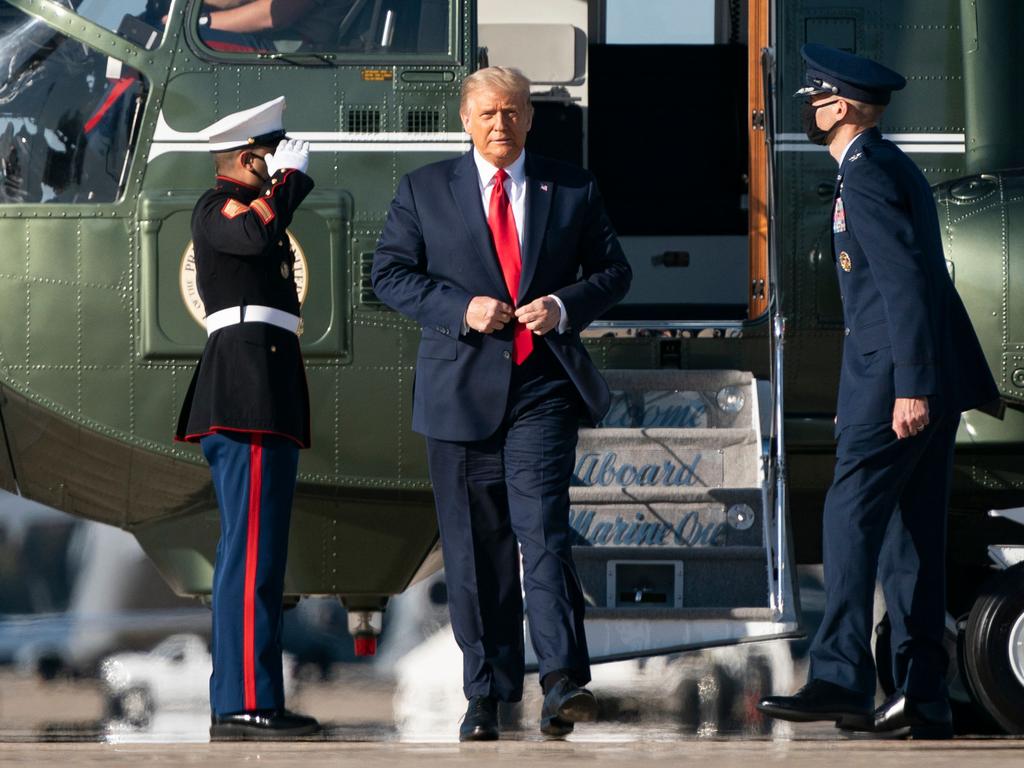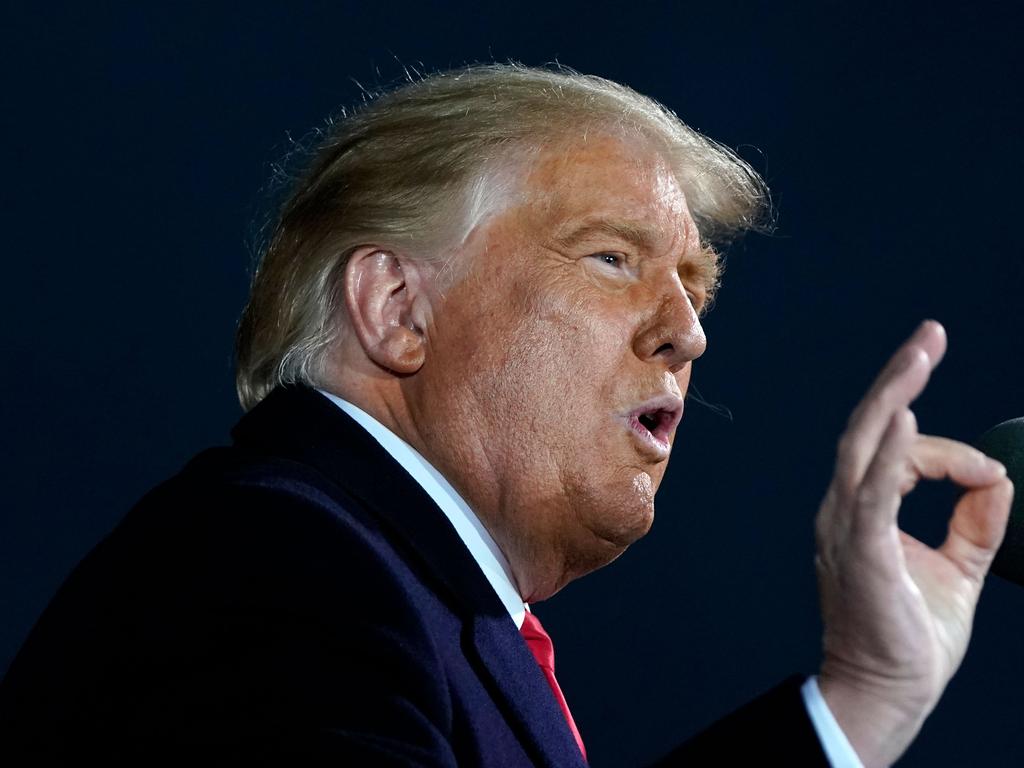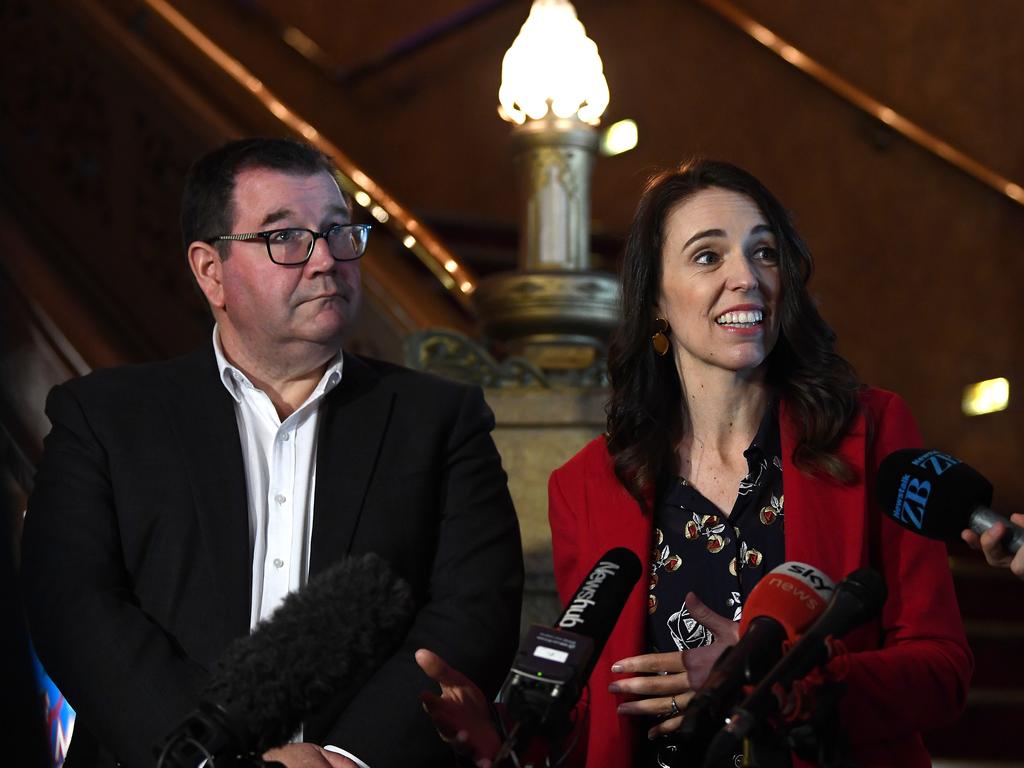2020 race: Facebook, Twitter kick own goal in Hunter Biden ‘scandal’
The biggest story to emerge from reports about Joe and Hunter Biden and Ukraine is how the tech titans censored them.
The biggest story to emerge so far from the New York Post reports about Joe Biden, his son Hunter and Ukraine company Burisma, is not what they reveal but the fact they were censored by Facebook and Twitter.
Donald Trump and Republican congressmen have hit back hard at the tech giants for taking steps to limit the spread of the story on the grounds that there were questions over its veracity.
“This is election interference and we’re 19 days out from an election,” a furious Republican Senator Ted Cruz said on Friday (AEDT). “It has no precedent in the history of democracy. The Senate Judiciary Committee wants to know what the hell is going on.”
“So terrible that Facebook and Twitter took down the story of “Smoking Gun” emails related to Sleepy Joe Biden and his son, Hunter, in the @NYPost. It is only the beginning for them,” Trump tweeted.
So terrible that Facebook and Twitter took down the story of “Smoking Gun†emails related to Sleepy Joe Biden and his son, Hunter, in the @NYPost. It is only the beginning for them. There is nothing worse than a corrupt politician. REPEAL SECTION 230!!! https://t.co/g1RJFpIVUZ
— Donald J. Trump (@realDonaldTrump) October 14, 2020
Facebook said it limited distribution of the Post’s story so it could fact-check the claims. Twitter said it was blocking the article because it was obtained from hacked materials, in this case from the hard drive of a computer allegedly owned by Hunter Biden.
So what was the story and were the tech giants right to try to block it from social media?
The story itself – so far – is less exciting than the censorship debate it has provoked.
Let’s assume, for argument’s sake, that everything the Post reported is correct.
The Post has reported alleged emails from Hunter Biden that it says were recovered from the hard drive of a computer which he left at a computer repair shop in Delaware.
Among these alleged emails is one sent to Hunter Biden by an adviser to the Ukraine energy company Burisma where Hunter was a board member.
The Post cites an email that this adviser, Vadim Pozharskyi, allegedly sent to Hunter Biden thanking him for “giving an opportunity to meet your father” and to spend “some time together.”
If true, this would potentially cast doubt on Joe Biden’s claim that he never discussed Hunter’s business interests in the Ukraine with his son.

Both the Biden campaign and Hunter Biden’s lawyer say such a meeting never took place.
But even if you assume both Bidens are lying, the alleged email does not point to any wrongdoing by Joe or Hunter Biden, much less a political scandal of any significance without corroborating evidence to prove and contextualise exactly what took place.
One reason why Facebook and Twitter had doubts would appear to be the bizarre way the story came to light and the potential for it to be an example of political disinformation so close to an election.
According to the Post, John Paul MacIsaac the owner of the computer repair shop in Delaware said the computer was brought to his shop for repair in April 2019. He thinks it was Hunter Biden who brought it in but he can’t be totally sure because MacIsaac is legally blind.
When the computer’s owner, allegedly Hunter Biden, did not come back to pick up the computer, MacIsaac said he became curious and examined its contents.
He says he then contacted three Congressmen and the FBI and somehow the computer’s contents ended up with Trump’s lawyer Rudy Giuliani and former Trump adviser Steve Bannon.
The Post says Giuliani gave it a copy of the hard drive and the newspaper believes the emails are genuine.
Other media outlets, including the Washington Post, say they have not been able to make their own assessment on whether the emails are real because neither Giuliani or Bannon have responded to requests from them to review the hard drive. These are the unusual circumstances in which both Facebook and Twitter chose to censor the story.
The problem for these tech giants is that this relatively new notion of intervening to limit political disinformation – including possible election disinformation planted by foreign adversaries such as Russia – needs to be as even-handed as possible.
So far, the censorship axe appears to be falling only on one side of politics, the conservative side.
There was no Twitter and Facebook intervention for fact-checking when the New York Times recently ran realms of pages on what it purported to be Donald Trump’s tax returns. Nor when the media spread the details of the salacious Steele Dossier which made false and damaging claims about Trump.
If tech giants are going to take the sweeping step of censoring political stories published by mainstream media, they must be willing to censor both sides of politics if they want to be seen as impartial.
The decision to censor an anti-Biden news report which did not even live up to its ‘explosive’ billing, only ensured that Facebook and Twitter turned themselves into the story.
(Cameron Stewart is also US Contributor for Sky News Australia)







To join the conversation, please log in. Don't have an account? Register
Join the conversation, you are commenting as Logout